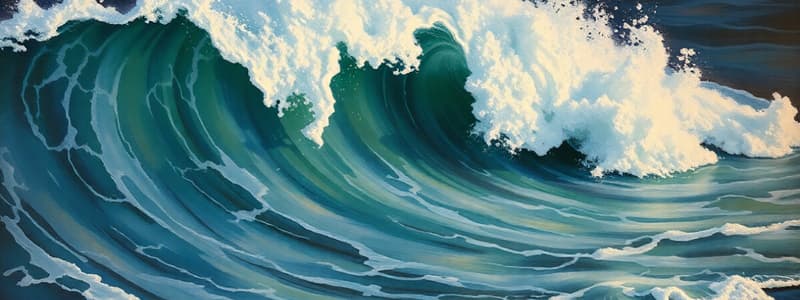Podcast
Questions and Answers
What is a mechanical wave?
What is a mechanical wave?
- A wave that can travel in a vacuum
- A wave that needs a medium to travel (correct)
- A wave that only exists in electromagnetic form
- A wave that travels without a medium
What defines a transverse wave's movement?
What defines a transverse wave's movement?
- It travels parallel to the source's motion
- It travels perpendicular to the source's motion (correct)
- It travels in straight lines only
- It travels in circular motion
Which of the following is NOT an example of electromagnetic radiation?
Which of the following is NOT an example of electromagnetic radiation?
- Radio waves
- Microwaves
- X-rays
- Sound waves (correct)
What is the correct definition of rarefaction in a longitudinal wave?
What is the correct definition of rarefaction in a longitudinal wave?
Which type of wave combines characteristics of both transverse and longitudinal waves?
Which type of wave combines characteristics of both transverse and longitudinal waves?
What part of a transverse wave represents the lowest point?
What part of a transverse wave represents the lowest point?
Which statement is true about waves?
Which statement is true about waves?
In which medium would sound waves travel the fastest?
In which medium would sound waves travel the fastest?
What happens to the energy of a wave if its amplitude is doubled?
What happens to the energy of a wave if its amplitude is doubled?
Which property of a wave is measured in hertz (Hz)?
Which property of a wave is measured in hertz (Hz)?
How is the speed of a wave calculated?
How is the speed of a wave calculated?
In which scenario would sound travel fastest?
In which scenario would sound travel fastest?
What describes the distance a wave travels before it begins to repeat?
What describes the distance a wave travels before it begins to repeat?
Which wave characteristic is affected by the energy input of the original source of vibration?
Which wave characteristic is affected by the energy input of the original source of vibration?
If a wave has a frequency of 3 Hz, how many complete waves pass a point in one second?
If a wave has a frequency of 3 Hz, how many complete waves pass a point in one second?
What demonstrates the periodic nature of waves?
What demonstrates the periodic nature of waves?
Flashcards
Mechanical Wave
Mechanical Wave
A wave that needs a medium to travel.
Electromagnetic Wave
Electromagnetic Wave
A wave that does not need a medium to travel.
Transverse Wave
Transverse Wave
A wave where the motion is perpendicular to the energy transfer.
Longitudinal Wave
Longitudinal Wave
Signup and view all the flashcards
Crest (Wave)
Crest (Wave)
Signup and view all the flashcards
Trough (Wave)
Trough (Wave)
Signup and view all the flashcards
Compression (Wave)
Compression (Wave)
Signup and view all the flashcards
Rarefaction (Wave)
Rarefaction (Wave)
Signup and view all the flashcards
Wave Amplitude
Wave Amplitude
Signup and view all the flashcards
Wave Wavelength
Wave Wavelength
Signup and view all the flashcards
Wave Frequency
Wave Frequency
Signup and view all the flashcards
Wave Speed
Wave Speed
Signup and view all the flashcards
Wave Energy
Wave Energy
Signup and view all the flashcards
Wave Energy Relation
Wave Energy Relation
Signup and view all the flashcards
Study Notes
Wave Properties
- Waves transfer energy from one place to another
- A medium is the material a wave travels through
- A vacuum is a completely empty space
- Mechanical waves require a medium to travel, sound waves are an example
- Electromagnetic radiation does NOT require a medium to travel, visible light, radio waves, X-rays, and microwaves are examples
Types of Waves
- Mechanical waves are classified based on how they move
- Two main types: transverse and longitudinal
- Transverse wave:
- Travels perpendicular (at a 90-degree angle) to the source's motion
- Example: moving a rope up and down
- Crest: the highest part of the wave
- Trough: the lowest part of the wave
- Longitudinal wave:
- Travels parallel to the direction of the vibrations
- Compression: parts where the coils are close together
- Rarefaction: parts where the coils are spread out
- Surface wave:
- A combination of transverse and longitudinal waves
- Moves in two directions (circular motion)
- Example: ocean waves
Properties of Waves
- Waves can carry a small or large amount of energy
- Basic properties: amplitude, wavelength, frequency, and speed
- Amplitude: the distance between the highest crest and the resting position. More energy = greater amplitude
- Wavelength: the distance a wave travels before repeating (crest to crest, or trough to trough)
- Frequency: the number of times a wave repeats in a given amount of time, measured in Hertz (Hz). One wave per second = 1 Hz
- Speed: the distance a wave travels in a certain amount of time; different waves have different speeds. Light travels much faster than sound in air. Light travels faster in water than in glass
Wave Energy
- Waves transmit energy from place to place; energy input depends on the source of vibration.
- Faster vibrations transmit more energy; larger amplitude vibrations transmit more energy
- Wave energy is proportional to frequency and the square of the amplitude.
Lesson Check
- If the amplitude of a wave increases, the energy increases proportionally to the square of the increase in amplitude.
- A jackhammer produces mechanical waves.
- A cyclic and periodic wave repeats in a predictable pattern.
- You measure a longitudinal wave's amplitude by measuring the distance between the resting position and the closest compression or rarefaction.
- If a musician increases the wavelength of a sound wave without changing the speed, the frequency decreases
Studying That Suits You
Use AI to generate personalized quizzes and flashcards to suit your learning preferences.




